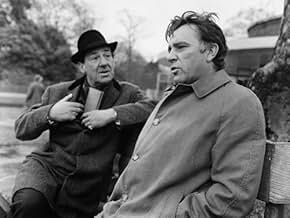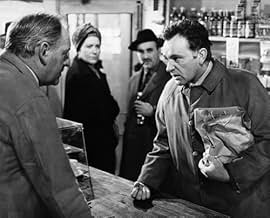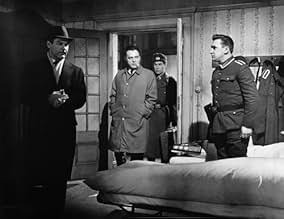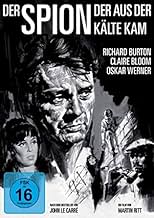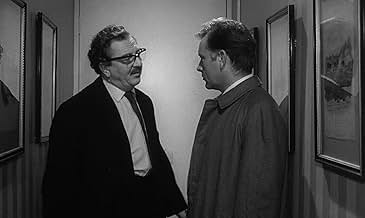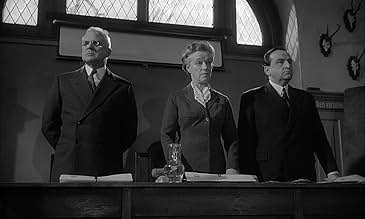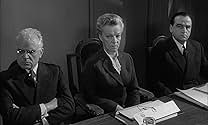O agente britânico Alec Leamas se recusa a voltar da Guerra Fria durante os anos 60 e opta por enfrentar outra missão, que pode ser sua última.O agente britânico Alec Leamas se recusa a voltar da Guerra Fria durante os anos 60 e opta por enfrentar outra missão, que pode ser sua última.O agente britânico Alec Leamas se recusa a voltar da Guerra Fria durante os anos 60 e opta por enfrentar outra missão, que pode ser sua última.
- Direção
- Roteiristas
- Artistas
- Indicado a 2 Oscars
- 10 vitórias e 5 indicações no total
- Hans-Dieter Mundt
- (as Peter Van Eyck)
- Direção
- Roteiristas
- Elenco e equipe completos
- Produção, bilheteria e muito mais no IMDbPro
Avaliações em destaque
They always said real spies were less James Bond and more Alec Leamas.
Middle aged, bitter, alone, likely to be divorced, drink too much, politically slightly left of centre.
John Le Carre's The Spy Who Came In from the Cold is noted for maybe showing the true face of spycraft.
On the fringes it has characters like George Smiley. As it goes on, the only person in control is Control. His talk to Leamas about the dirty things the spy services have to do. It is not small talk. It is the literal truth.
Alec Leamas (Richard Burton) messes up an operation in Berlin and is recalled to Britain.
He has been given a new assignment. Leamas has to pretend to have been thrown out by the security services.
It is a ruse for Leamas to come into the attention of British communists and East German intelligence. Be seen as a potential defector.
Leamas is meant to bring down an East German high ranking intelligence officer named Mundt. Leamas finds himself deep of a complex and messy espionage game.
American director Martin Ritt seems to be at ease with such complex material. He makes sure to include a pivotal scene where an important plot point is explained. So many times, espionage films want to leave it dense.
Ritt was left wing and a victim of the McCarthyite witch hunts. Maybe that explained why he was able to identify with an outsider like Leamas and the complex manoeuvrings of the intelligence agencies.
As for Burton, he was already halfway there as the self loathing alcoholic Leamas. The rest was courtesy of a good script and his acting ability.
This black and white film recreates the sullen atmosphere of cold war espionage in a way that color seems to diminish for some unexplainable reason. Those were black and white kinda times in my memory. Depressing, frightening and dour.
George Smiley makes a small appearance, albeit very important as a character in the plot line, and is nicely played by Rupert Davies, capturing the diffident and wry Smiley as effectively as Guinness did later on and Denholm Elliot even further on in the TV film 'A Murder of Quality'. Cyril Cusack's Control could easily be the younger version of Alexander Knox's masterful rendition in the Smiley TV shows. The continuity suggested in all of these films is very satisfying. It's a shame so many of the other versions of LeCarré's novels are so mediocre... ie 'The Little Drummer Girl' with a totally miscast Diane Keaton, and 'The Russia House', too Hollywood by half.
Richard Burton turns in just about the greatest performance of his life here. He is the embodiment of the disillusioned, bitter and down-trodden ego-maniac that seems to be the basic cocktail for a spy's personality, according to LeCarré.
I've seen this film many times but just recently spotted LeCarré himself (at least it certainly looks like him) as an extra in a short scene. As Leamas is making his roundabout way to Smiley's house at 9 Bywater Street, he is exiting the first of 2 taxis. As he does so a tall, lean man in black is walking towards him. Ritt seems to be focusing the camera on this "extra" actor who actually makes furtive glances at Leamas. It is later revealed that Leamas has been followed by the Communists. Could LeCarré be playing that non-speaking, uncredited part of the Eastern "watcher" trailing Leamas to Smiley's house? Wouldn't surprise me in the least. It's a part LeCarré would have enjoyed playing, I think.
And, like Hitchcock, LeCarré has appeared in film adaptations of his books before.
Claire Bloom is excellent as the naive English communist who hasn't got a clue as to what she's supporting. The end of this film is always shocking to me. The ruthlessness of the spy-masters, the lies, the back-stabbing.... There is nothing over-blown in this film. It's all very subtle and intriguing and with the passage of time just gets more and more fascinating.
Highly recommended to fans of this genre, especially LeCarré fanatics. If you haven't read his books you are missing out on perhaps the finest living writer of the English language. Some "experts" think his writing style is out of date because the plots are so involved and the prose so full of humor and political incorrectness; I read something to that effect in the most recent edition of the 'Halliwell' guide. Perhaps the editor of that book has A.D.D. or something, or perhaps he's just seen to many glitzy, empty flicks designed to entertain the gawping masses, I don't know. To me, LeCarré will never go out of style and it is to be hoped the film adaptations of his books will continue to be made. A few remakes wouldn't be out of order either.
Burton is cast as Alex Leamas, a nerve-dead, aged secret operative operating out of West Berlin. After a routine assignment goes awry, Leamas is sent home and out of the service. He struggles to try to live a normal, average life as a librarian's assistant, but he can't make it work for him (something that is not helped by his chronic alcoholism). This fact is made forcefully clear when he winds up beating a local grocer and is sentenced to jail time. Slowly but surely, he allows himself to be pulled back into the Cold War he operated in, not suspecting or maybe not even caring that his superiors are setting him up for a fall.
One will never mistake Alex Leamas' grey, rainy world for the sunlight universe of James Bond. It offers what is probably the ugliest depiction of the Great Game on film: drunkards, ex-Nazis, Jews, and die-hard Communists swimming like sharks through a fish pond, all of them devouring any who get in their way. None have any more than lip-service loyalty to their fellow operatives, their countries, or maybe even their own ideologies. At it's center stands Burton, playing Leamas as a walking dead man, festering with hate, resentment, and cynicism at the system that eventually sends him into the gutter. His devastating parked car monologue alone is worth the price of renting this one from the local video store.
It's bitter cynic tone may have been the film's undoing; rarely have I seen a film so downbeat in it's depiction of humanity. Still, it is not one that deserves to be forgotten.
Você sabia?
- CuriosidadesAfter Richard Burton became a superstar, he insisted on casting his friends from his days at the Old Vic and West End (London's equivalent to New York City's Broadway). Friends of Burton's cast in this movie included Michael Hordern and Robert Hardy. Burton's former leading lady (on-stage and in two movies) Claire Bloom, however, was cast by Martin Ritt. This caused friction for several reasons: Burton had wanted his wife, Dame Elizabeth Taylor, in the role, and he and Bloom had been an item in the 1950s. John le Carré remembers that "off-screen Bloom preserved a dignified distance in her caravan".
- Erros de gravaçãoAt the beginning of the film they say that Leamas has been waiting for days for the arrival of Riemeck. This behavior doesn't make sense, as it gives away the arrival of a defector to the opposing side.
- Citações
Alec Leamas: It was a foul, foul operation, but it paid off.
Nan Perry: Who for?
Alec Leamas: What the hell do you think spies are? Moral philosophers measuring everything they do against the word of God or Karl Marx? They're not! They're just a bunch of seedy, squalid bastards like me: little men, drunkards, queers, henpecked husbands, civil servants playing cowboys and Indians to brighten their rotten little lives. Do you think they sit like monks in a cell, balancing right against wrong? Yesterday I would have killed Mundt because I thought him evil and an enemy. But not today. Today he is evil and my friend. London needs him. They need him so that the great, moronic masses you admire so much can sleep soundly in their flea-bitten beds again. They need him for the safety of ordinary, crummy people like you and me...
Nan Perry: You killed Fiedler!
Alec Leamas: How big does a cause have to be before you kill your friends? What about your Party? There's a few million bodies on that path!
- ConexõesFeatured in Great Performances: Richard Burton: In from the Cold (1988)
Principais escolhas
Detalhes
- Data de lançamento
- País de origem
- Central de atendimento oficial
- Idiomas
- Também conhecido como
- O Espião que Veio do Frio
- Locações de filme
- Smithfield Market, Dublin, County Dublin, Irlanda(Checkpoint Charlie, Berlin - opening scene: Leamas waits for the agent to come through the border from East Germany)
- Empresa de produção
- Consulte mais créditos da empresa na IMDbPro
Bilheteria
- Faturamento bruto mundial
- US$ 529
- Tempo de duração1 hora 52 minutos
- Cor
- Proporção
- 1.85 : 1



